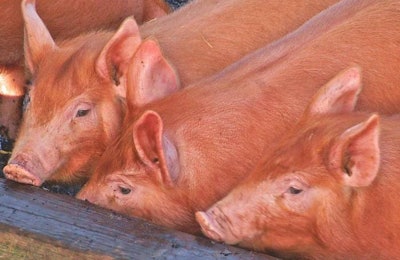
Since the start of April, new outbreaks of classical swine fever (CSF) have been confirmed in domestic pigs at six more locations in Japan, and the virus has been detected in around 80 more wild boars.
A further two outbreaks of CSF on pig farms in Japan were reported last week by the Ministry of Agriculture, Forestry and Fisheries, bringing the country’s total number of outbreaks in domestic animals since September of last year to 22.
The latest cases were confirmed at a farm with 1,030 pigs at Tahara city in Aichi prefecture on April 21, following suspicious symptoms in a breeding pig. After the infection was confirmed, a further 851 swine at three nearby farms that shared personnel and equipment were also culled because of the disease risk they posed, bringing the losses in this outbreak to 1,881 animals.
On the following day, the CSF virus was confirmed at Japan’s 22nd pig farm, which had 1,186 animals in Seto city, also in Aichi prefecture. The premises are located in a control area set up following three previous CSF outbreaks, according to the agriculture ministry, and no pigs had been moved there since March 27.
Previously during April, the ministry had reported CSF cases to the World Organisation for Animal Health (OIE) at three farms and one slaughterhouse.
These involved two farms in Ena city in Gifu prefecture (3,521 and 9,729 domestic pigs), and one (with 4,562) in Seto city. A number of animals had shown symptoms of illness, such as fever or reduced appetite, which prompted testing for the CSF virus. Related to one of the Ena outbreaks, 67 pigs were destroyed at a Gifu city slaughterhouse.
Official reports from the agriculture ministry put the number of farms directly impacted by CSF outbreaks at 22, with pigs at a further 11 locations affected because of epidemiological links to infected sites.
The total number of domestic pigs that have died or been culled in Japan as a result is now more than 88,000, based on data from the agriculture ministry’s outbreak summaries.
The majority of these losses have been in Gifu prefecture, with a growing number of the more recent cases in neighboring Aichi. The virus has also been detected at farms in the prefectures of Nagano, Osaka, and Shiga.
New wild boar cases in Gifu
All 79 cases of CSF in wild boar reported by Japan’s animal health agency to the OIE during April have been in Gifu prefecture, although some previous cases were in Aichi.
Oral vaccination using baits to attract wild boar was initiated Gifu and Aichi prefectures in late March.
Since testing of wild boar began in September 2018, 318 animals out of 994 sampled in Gifu have tested positive for the CSF virus, while in Aichi, 13 out of 233 tested were positive. The virus has not been detected in any of the 276 wild boar samples from 40 other prefectures.
Prior to September of 2018, Japan had been free of CSF since 1992. Source of the virus in the current outbreaks remains unknown, but recent gene sequencing shows it has the closest similarity to a virus isolated in Beijing, China.

















